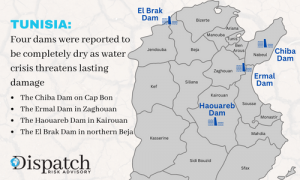Tunisia: Water Crisis Looms as Potential for Economic, Social Damage Build
Summary:
On 23 April 2023, the Tunisian government reported that four of the country’s dams are completely dry as the national water crisis looms heading into the summer months. Multiple years of below average rainfall combined with longer-term stresses on the water supply have brought Tunisia to the point of crisis.
The four dams identified as being dry were:
- The Chiba Dam in Nabeul
- The Ermal Dam in Zaghouan
- The Haouareb Dam in Kairouan
- The El Brak Dam in northern Beja

The circumstances prompted a government declaration that potable water supplies would be cut during the evening hours across the country. Some areas have experienced nearly daily cuts during the evening while others have experienced less frequent cuts or none at all. Regulations remain in place prohibiting the use of potable water for washing vehicles, irrigating farmland, or watering green spaces in cities.
In Monastir, the governorate has established a council to oversee the disposition of regional water resources. The Governor announced plans to address water stress through the addition of waste water treatment facilities and efforts to recover rain water, 80% of which is estimated to flow into the sea.
Recent reporting from Gallup highlighted the growing discontent among Tunisians about how the environment is being managed. Water supply and quality are among many other areas of dissatisfaction. Some commentators have identified the water crisis as potentially driving political frustration.
Outlook:
While the water crisis itself has led to some frustrations among Tunisians, it is the downstream impacts of the dwindling supplies that could become disruptive as agriculture and other industries are disrupted.
The medium-term economic impacts of the water crisis on Tunisia’s rural west, center, and south hold the potential to create frustration with the extended debates over policy in Tunis.
Our team is continuing to monitor events and sentiment that could lead to unrest or disruptions emanating from rural areas.
Explore our services or speak with our team of North Africa-based risk experts.